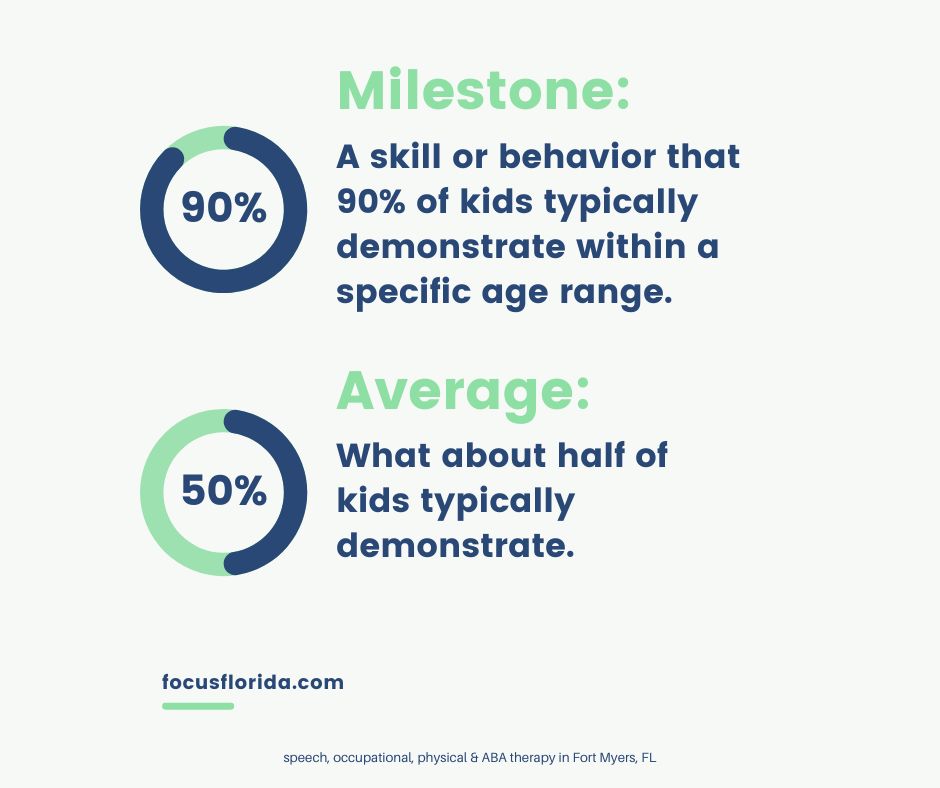Blog

The Best Age for Fort Myers Speech Therapy? Mind the Milestones.
When we’re looking at the best age for kids to start a Fort Myers speech therapy program, one thing we’re going to zoom in on is whether they’re meeting certain developmental and language milestones.
In the first 3 years of life, a child’s brain grows and matures rapidly. It’s an intensive period for acquiring critical speech and language skills. These are developed in a world that is rich with sights, sounds, and regular exposure to the speech and language use of the people all around them – parents, daycare workers, siblings, grandparents, cousins, friends, shop workers, and more.
One of the reasons language develops so fast during this time period is that the brain of a baby, toddler, and young child has a great deal of plasticity. What this means is it’s able to absorb a great deal for quickly. It also means that the neuropathways that allow us to cement certain skillsets are not yet rigid. So if one neuropathway isn’t working as it should, new ones can develop – assuming they are taught to do so. This is why early intervention therapies are so important.
Speech and language development can vary from child-to-child, but if they’re missing major milestones, it’s important to take action.

Too often, we see parents and even some specialists take a “wait-and-see” approach if a child isn’t meeting these milestones. But it’s our firm belief this is a mistake. Because just as quickly as kids develop these skills, they can also fall behind. If we pass these small windows of time without Fort Myers speech therapy intervention, it’s going to be more difficult for the child to learn. Not impossible, mind you, but tougher.
CDC Milestones for Speech Language Development
The U.S. Centers for Disease Control & Prevention has a hearing & communicative development checklist that we recommend reviewing (it’s based on the “How Does Your Child Hear & Talk” guide from the American Speech-Language hearing Association). Ultimately though, if you have a concern, it’s best to start exploring interventions right away.
Even if professionals evaluate your child and determine they don’t need Fort Myers speech therapy, it’s better than waiting too long and having the impact of a delay snowball – particularly considering that so many specialists and clinics in Southwest Florida are on extensive waitlists.
As Fort Myers speech therapists, we always urge a proactive approach rather than a reactive one when it comes to a child’s communication skills. Parents sometimes wish they had started the process sooner, but almost never regret starting as soon as they did.
-Jennifer Voltz-Ronco, Speech-Language Pathologist & Owner/Founder of FOCUS Therapy
Some milestones to consider:
Birth to 3 Months
- Reacts to loud sounds
- Calms down or smiles when spoken to
- Recognizes your voice & clams down if crying
- When feeding, starts or stops sucking in response to sound
- Coos and makes pleasure sounds
- Has a special way of crying for different needs
- Smiles when he/she sees you
4 to 6 Months
- Follows sounds with eyes
- Responds to tone of voice changes
- Notices toys that make sounds
- Pays attention to music
- Babbles in a speech-like way with lots of different sounds, including those that begin with p, b, and m
- Laughs
- Babbles when happy, excited, or unhappy
- Gurgles when alone or playing
7 Months to 1 Year
- Likes playing pat-a-cake & peek-a-boo
- Turns and looks to where sounds originate
- Listens when spoken to
- Understands common words like “milk,” “up,” “cup” etc.
- Responds to basic requests “come here”
- Babbles using short and long groups of sounds (upup, bibibi, tata, byeybye)
- Babbles to get up or to keep attention
- Communicates with gestures like holding up arms, waving, or even pointing
- Imitates various speech sounds (even if they don’t make sense)
- Has 1 or 2 words (Hi, Mama, Dada, Bye-bye)
1-2 Years
- Knows a few body parts, can point to them if asked
- Follows simple commands “bring the cup,” “roll the ball” and simple questions, “where is the dog?”
- Likes simple rhymes, songs, and stories
- Will point to pictures in books when named
- Picks up new words on a regular basis
- Uses some of those 1-2 word questions “Go bye-bye?” “Where doggy?”
- Can put together 2 basic words “more juice” “want car”
- Uses different consonant sounds at the start of words
2-3 Years
- Has words for most everything
- Uses 2-3-word phrases to talk about and ask for things
- Can use the d, n, t, f, g, and k sounds
- Is easily understood when talking to family and friends
- Can easily name objects to ask for or direct attention to them
3-4 Years
- Hears when you call from another room
- Asks simple WH questions (who, what when, where, why)
- Talks about preschool, grandparents’ house, activities with friends
- Uses sentences with 4 or more words
- Speaks easily without having to repeat words or syllables
4-5 Years
- Pays attention to short stories and can answer basic questions about it
- Hears & understands most of what is said at home and in school
- Uses sentences with lots of details
- Tells stories that stay on topic
- Communicates easily with adults and other kids
- Uses rhyming words
- Names letters and numbers
- Says most sounds correctly (except for tricky ones like r, s, v, l, ch, z, sh, and th)
These milestones are understood to be when about 90 percent of typically developing kids in a given age range have mastered these skills.
Although we don’t want parents stressing milestones, it’s a good idea to keep track of them because we don’t want them to fall behind.
Also worth noting is that these are just the basic milestones for speech and hearing. There are others that focus on growth, movement, physical development, and literacy. Any kind of concern for speech, language, or hearing issues is best addressed promptly. In addition to in-depth exams, FOCUS also offers free screenings to help you determine if it’s an issue you should raise with your pediatrician.
Should I Be Comparing My Child’s Speech & Language to Other Kids in Their Class?
The answer to this is yes… And no.
Again, every kid develops speech and language at their own pace. There is a broad range for what is typical in speech language development. Some kids might be really advanced, and others might lag behind. You don’t want to get hung up on line-item comparisons.
However, where you want to really pay attention and act is when you see the development gap between your child and their peers widen – and continue to widen. It’s not about comparing them to other kids solely to highlight their deficits, but rather to see where they may need more support and possibly intervention.
If your child is not meeting key speech & language milestones, having an evaluation for Fort Myers speech therapy can help determine if early intervention is needed. And don’t worry, it’s not a “test” in the typical sense; they aren’t sitting at a desk for an hour+. We find fun ways to to engage and entertain them based on their age, interests, and skillsets. We’re looking to gauge their skills and determine where they may need additional supports.

Sooo… When Should My Child Start Fort Myers Speech Therapy?
When people ask us, “At what age should speech therapy begin?” the best answer is really: When you notice the child is falling behind and not meeting those key milestones.
A lot of kids are referred for speech and language delays when they’re about 18-months-old. But some are younger, and some are a bit older. Kids with known disabilities often start from the time they’re infants. Sometimes we don’t get referrals until the child is preschool age and their deficits are more pronounced in a classroom setting. It just depends.
Ideally, we like to start before age 3. However, we’ve been able to make great strides with kids who are older too.
Again, keep in mind that even if you aren’t sure your child needs speech therapy, it’s likely to take time to get in with specialists like audiologists and speech therapists who can conduct a full evaluation. Better to initiate the process now and not need it than to wait and have your child falling even further behind.
Some pediatricians will advise waiting a bit to see whether a child develops skills on their own. Although it’s true that some kids will catch up on their own, the reality is: We have no way of knowing which kids will be fine without intervention and which are going to see their communication deficits snowball. It is never going to hurt to reach out for speech & language supports. But waiting too long to reach out can set your child back significantly.
Keep in mind: Communication is how we engage with and learn about the world around us. If a child is falling behind on that, it’s going to have a domino effect on most other areas of development as well. That’s why we never recommend a “wait and see” approach.
Pay attention to the milestones. Talk to your child’s pediatrician. Ask for a referral to a speech-language evaluation – for your own peace of mind, if nothing else.
If your child is recommended to receive speech therapy but you are put on a waitlist for services, our team can also recommend resources and at-home exercises to help you bridge the gap until you can begin speech therapy.
FOCUS offers pediatric speech therapy in Fort Myers and throughout Southwest Florida. Call (239) 313.5049 or Contact Us online.
Additional Resources:
Developmental Milestones Matter, CDC
More Blog Entries:
Fort Myers Speech Therapist Tips for Kids Who Struggle With “Inside Voices”, July 30, 2022, FOCUS Fort Myers Speech Therapy Blog

Comments are closed.